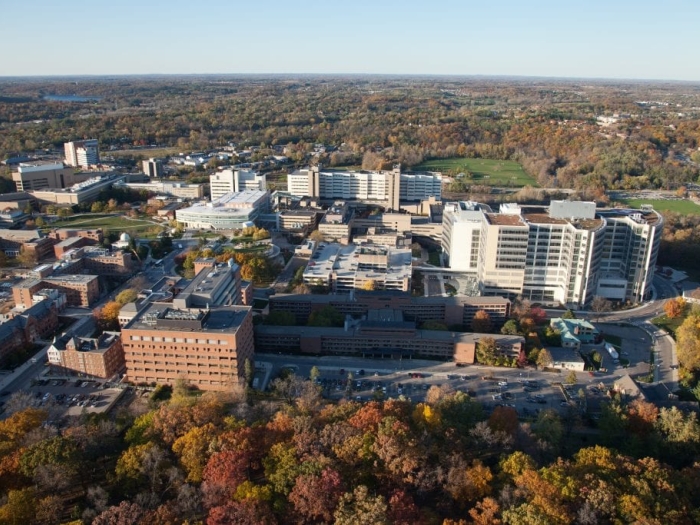Red Cross blood shortages make donating even more important this year.
Author |
After a year of pandemic pivoting, the largest single-day blood drive on the University of Michigan’s Ann Arbor campus is returning to its signature location at Michigan Stadium.
Yet pandemic-related shortages remain. On Nov. 21, Wolverines for Life and its partners will host Be a Hero at the Big House at the Jack Roth Stadium Club, offering students and area residents the opportunity to donate blood at a time when there’s an urgent need.
From 8 a.m. to 5 p.m., attendees can donate blood, join the Michigan Organ Donor Registry and/or undergo screening to become a bone marrow donor. Although the event is presented in an open-house style, we encourage attendees to make an appointment if they are planning to donate blood. For more information on how to make an appointment, visit www.wolverinesforlife.org or check out the Wolverines for Life page on Facebook
Special guests, including former U-M and NFL football player Jon Jansen, U-M Transplant Center physicians and local mascots, will make appearances at Be a Hero. The full event schedule will be available on the Wolverines for Life website soon.
There will also be entertainment throughout the day, including a kids’ game area, a selfie station, cider and doughnuts, trivia and a raffle with giveaways from partners such as the American Red Cross, Gift of Life Michigan and Be the Match. (Attendees will receive entries for things like showing a vaccination card at the door and filling out a survey with feedback about the event.) A lucky few will be able to watch the Detroit Lions game midday in Michigan Stadium’s luxury suites, and all attendees will receive a free T-shirt.
Masks will be required at all times, except when actively eating and drinking in designated areas, and all attendees must answer questions about health symptoms and recent travel via the ResponsiBlue app. Vaccination is encouraged.
“We were unable to hold Be a Hero at the Big House last year but were still able to collect 347 units of blood,” said Megan Podschlne, the program manager for Wolverines for Life. “We’re excited to be back in 2021 for our 11th annual event.”
With increased vaccination, the number of medical procedures has risen across the country, but blood donation has not kept pace. Donor turnout has reached the lowest levels of the year as many delayed giving amid a return to the workplace and in-person learning for many families as well as the surge in COVID-19 cases across the country due to the Delta variant.
As a result, the American Red Cross, Michigan Medicine’s blood transfusion partner, has low stores of crucial blood products. The need is particularly high for type O blood and platelets, the part of blood that clots. Be a Hero at the Big House is a way to help bridge that gap.
“We are grateful to the University of Michigan community members stepping up to help meet the emergency need for blood right now by donating blood,” said Red Cross Regional CEO Mary Lynn Foster. “Blood donors are everyday heroes — a single donation can make all the difference to a patient that needs a life-saving transfusion.”
This year will also mark the 40th annual Blood Battle, a series of blood drives across the U-M campus that serves as a competition between U-M and Ohio State University to collect more pints of blood. Be a Hero is the largest of the events in the Blood Battle, which takes place from Oct. 27 to Nov. 24. To schedule an appointment for any of the Blood Battle blood drives, visit www.redcrossblood.org and enter the promo code “goblue.”
"This year, in our 40th annual Blood Battle against Ohio State, we hope to collect a total of 1,500 units of blood at our drives around campus,” said Connor Burke, an executive board member of Blood Drives United, the student group that runs the Blood Battle at U-M. “Our all-time Blood Battle record is 22-16-1. With help from our partners at the Red Cross, volunteers, and donors in the Ann Arbor community, we are confident that we can meet our goal and add another win to our record."
“Like organ and tissue donors, people who donate blood are heroes,” said Dorrie Dils, CEO of Gift of Life Michigan, the state's organ and tissue recovery program and a member organization of Wolverines for Life. “I encourage anyone who is able to donate to do so. There is a critical need, and we can all do our part to help save lives.”
An Ohio native, Dils added, “Although I’m not sure which ‘side’ to root for in the competition, I know that everyone who participates and everyone who benefits will be the ultimate winners.”

Department of Communication at Michigan Medicine





